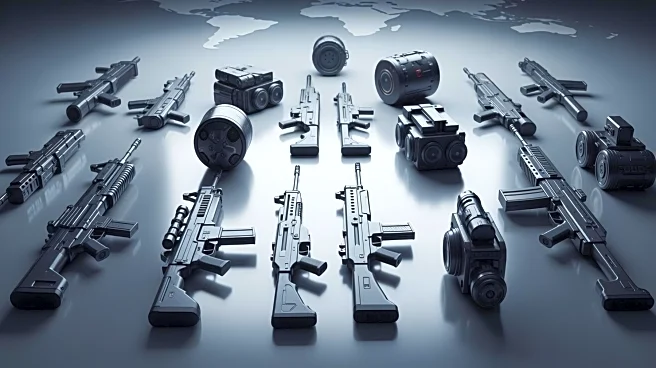What's Happening?
The Pentagon has announced a significant overhaul of its arms sales process, aiming to streamline operations and enhance support for U.S. allies. The Defense Security Cooperation Agency and the Defense Technology Security Administration, which manage
foreign military sales and export approvals, respectively, will now fall under the Pentagon's Acquisition and Sustainment leadership. This restructuring is intended to create a unified command chain for both foreign and domestic demands, reducing delays caused by nonstandard requests from partners. The initiative, led by U.S. Defense Secretary Pete Hegseth, seeks to prioritize speed, flexibility, and performance in the acquisition workforce, with a focus on designing weapons with export options from the outset.
Why It's Important?
This overhaul is crucial for maintaining the U.S.'s competitive edge in global arms sales and ensuring timely delivery of critical capabilities to allies. By streamlining the acquisition process, the Pentagon aims to reduce bureaucratic delays and enhance the efficiency of arms sales, which is vital in the context of ongoing geopolitical tensions, such as the conflict in Ukraine. The changes could also bolster the U.S. defense industry by creating jobs and expanding supply chains, potentially benefiting U.S.-based subsidiaries of European defense firms. The initiative reflects a broader push to improve the Pentagon's acquisition system, which has faced criticism for its complexity and lack of competition.
What's Next?
The Pentagon's Acquisition and Sustainment chief, Michael Duffey, has a 60-day timeline to collaborate with Undersecretary for Policy Elbridge Colby on an implementation plan. This plan will address how production schedules will be managed when U.S. and foreign orders compete for factory capacity. The focus will be on injecting urgency into the acquisition workforce to maximize production capabilities. Additionally, the reform may open opportunities for U.S.-based subsidiaries of European defense firms to expand their presence in the American market.
Beyond the Headlines
The reform touches on both government-to-government sales and direct commercial sales, which typically involve lower-sensitivity items licensed through the State and Commerce Departments. This dual approach could enhance the U.S.'s ability to meet diverse international demands while maintaining strategic partnerships. The backdrop of the Ukraine conflict underscores the need for rapid adoption of advanced military technologies, highlighting the importance of this initiative in preparing for future conflicts.
















